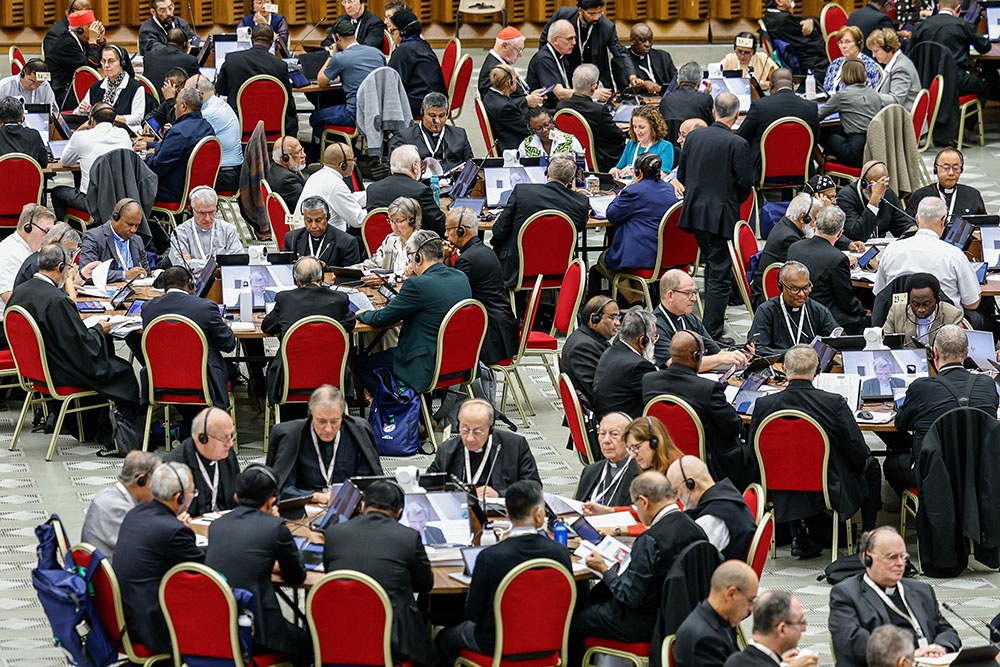
Synod members attend the morning session in the Paul VI Audience Hall at the Vatican Oct. 15. (CNS/Lola Gomez)
Amid the 2015 synod on the family, an anonymous group of cardinals wrote to Pope Francis protesting the direction of the Vatican summit that the then-newly elected pontiff had called to discuss divorce, remarriage and LGBTQ relationships.
During the pope's youth synod, in 2018, a group of prominent conservative writers and personalities formed a war room ready to call foul if the synod went astray.
A year later, synod opposition reached its zenith when vandals stole Indigenous statuettes and tossed them into Rome's Tiber River in protest of the Amazon synod, which wrestled with environmental concerns and the lack of access to the sacraments in the nine-nation South American region. Even Brazil's then-President Jair Bolsonaro had his men on the ground seeking to monitor the events unfolding in Rome and influence social media opinion against some of the synod's proposals.
But this year — as Francis' yearslong synod on synodality inches toward its Oct. 27 conclusion — the resistance has effectively gone silent.
It marks a stark contrast to last year, where ahead of the first session of the synod on synodality, far-right Latin American groups with deep ties to traditionalist Catholics in the United States released a book titled The Synodal Process Is a Pandora's Box.
The book was published in eight languages and sent to a number of synod delegates and Vatican Curia officials. And the day before the synod commenced, a Roman theater was rented out for one of the pope's chief critics, U.S. Cardinal Raymond Burke, to present the text and make his case against the synod.
"Even poking fun at it has become a bit tedious," wrote Canadian Fr. Raymond de Souza in the pages of First Things on the eve of this year's synod gathering.
Advertisement
That sentiment seems to be matched here on the ground, where there have been no real efforts to organize synod side events by those who have typically opposed the process or sought to warn against its potential outcomes. Even reporters from right-wing media websites that have spent years sounding the alarm against the synod have gone quiet, both in print and inside the Vatican's press office.
"The explanation is really very simple," said Jesuit Fr. Thomas Reese, a longtime Vatican observer who has covered synods since 1985. "Francis took all of the controversial, hot-button issues off the agenda, so the conservatives have nothing to complain about."
"They can basically declare victory," Reese told the National Catholic Reporter.
Earlier this year, the Vatican's synod office announced that the pope had created 10 special study groups to provide greater reflection of some of the synod's most contentious questions, including on women deacons and LGBTQ questions.
At the start of this year's synod assembly, each group provided initial updates on their work but their final reports aren't due until June 2025. This has meant that most of the conversations on questions that dominated much of last year's discussions have taken place outside of the synod hall.
According to Reese, this marks a noticeable change from past synods in the Francis era.
Past synod debates over whether divorced and remarried couples can receive Communion, the expansion of women's ministries, and LGBTQ concerns stoked widespread media attention and fueled both church reform groups and the synod resistance movements.
"You had something people could get their teeth in, both the progressives and the reactionaries, and it was easy to see the fight," said Reese of the atmosphere surrounding past synods. By contrast, the most concrete changes that have surfaced inside the synod hall at this year's summit have involved changes in canon law to better promote transparency and accountability.
In his last article before his death in January 2023, Australian Cardinal George Pell fumed that the upcoming synod on synodality was a "toxic nightmare." But with the pope's study groups halting the dreams of many reform-minded advocates, conservatives seem to have made the bet that at this synod, it's best to let sleeping dogs lie.







